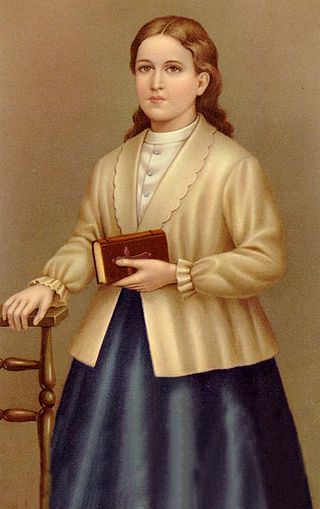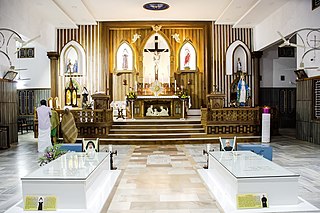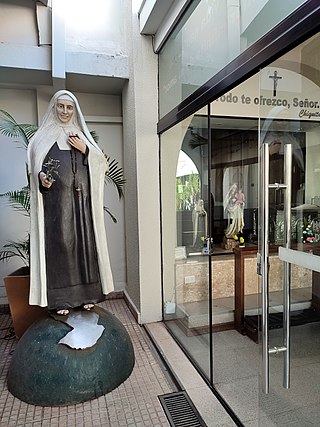
Narcisa de Jesús Martillo Morán was an Ecuadorian Catholic virgin. Martillo was known for her charitable giving and strict devotion to Jesus Christ while living a virginal and austere life of prayer and penance. The death of her parents prompted her to relocate in order to work as a seamstress while caring for the sick and poor. But her devotion to prayer and the mortification of the flesh was strong and it led her to the decision to live as a member of the Third Order of Saint Dominic in Patrocínio, (Peru) in June 1868, where she died on 8 December 1869.

Józef Bilczewski was a Polish Roman Catholic prelate who served as the Archbishop of Lviv from 1900 until his death. He served as a theological and dogmatics professor in the Lviv college after himself having earned two doctorates in the course of his own studies. He earned a reputation as a learned and cultured man; these qualities led to Emperor Franz Joseph I nominating him for the Lviv archdiocese as its head. Pope Leo XIII named him as its archbishop and he set to work prioritizing a range of different pastoral initiatives aimed at revitalizing the faith within people and also prioritizing ecumenical cooperation with other denominations.
Zofia Czeska-Maciejowska was a Polish religious sister and the founder of the Sisters of the Presentation of the Blessed Virgin Mary. Czeska was widowed following her call into the religious life. Her beatification was celebrated on 9 June 2013.

Mariam Thresia was an Indian Syro-Malabar Catholic professed religious and the founder of the Congregation of the Holy Family. She was born in Puthenchira, a village of Kerala, India. Thresia Mankidiyan became known for receiving frequent visions and ecstasies as well as even receiving the stigmata which she kept well-guarded. She had been involved in apostolic work her entire life and pushed for strict adherence to the rule of her order amongst her fellow religious.

Giuseppe Toniolo was an Italian Roman Catholic economist, sociologist, and pioneer of Christian democracy. A leading political and social economist, Toniolo condemned both socialism and laissez-faire capitalism, advocating instead for an economic system in which social, judicial, and economic forces cooperate proportionately for the common good. Toniolo was an early Catholic advocate of labour unions and social reform. Describing the economy as an "integral part of the operative design of God," his work was inspired by Catholic social teaching.
Giuseppina Nicoli was an Italian Roman Catholic religious sister. Nicoli - aged 20 at the time - became a member of the Vincentians and became a catechist in Sardinia where she was positioned for most of her life despite holding several positions of leadership in Turin and elsewhere for a brief period.

María del Carmen Sallés y Barangueras, also known by her religious name Carmen of Jesus, was a Spanish Roman Catholic professed religious and the founder of the Missionary Sisters of the Immaculate Conception. Sallés is best known for being a strong advocate of both genders being equal and a staunch defender of the rights of women, since she made this the focus of her life from the beginning of her entrance into the religious life.

Anna Maria Rubatto was an Italian Roman Catholic nun who assumed the name Maria Francesca of Jesus.

Luigi Novarese was an Italian Roman Catholic priest and the co-founder of the Apostolate of the Suffering as well as the Silent Workers of the Cross. Novarese also established the Marian Priest League and the Brothers and Sisters of the Sick; he built several homes for those who were ill and disabled. He served in the Secretariat of State until leaving that position to work alongside the Italian Episcopal Conference and to dedicate more time to the ill and to the work of his orders.

Assunta Marchetti was an Italian Roman Catholic religious sister and the co-founder of the Missionary Sisters of Saint Charles Borromeo Scalabrinians; she worked in Brazil from 1895 until her death. She has been beatified as a Blessed Mother. Her priest brother Giuseppe is titled as Venerable on the path to sainthood.
Giacomo Abbondo was an Italian Roman Catholic priest who hailed from Vercelli. Abbondo served as a pastor and provost in his home town of Tronzano where he administered to the people while proclaiming the message of the Gospel and bringing the sacraments to his parishioners.

Maria Karłowska – in religious Maria of Jesus Crucified – was a Polish Roman Catholic professed religious and the founder of the Sisters of the Divine Shepherd of Divine Providence. Karłowska worked with poor and abandoned people with an emphasis on girls and also tried to aid prostitutes avoid such a life and build another kind of life so used her order to reach out to such people to render assistance.
Antonia Maria Verna was an Italian Roman Catholic religious sister and the founder of the Suore di carità dell'Immacolata Concezione. Verna left her hometown when she was fifteen due to increasing offers of marriage and returned sometime later when she decided to pursue her religious vocation. Her emphasis was on catechism and founded her religious congregation to better teach catechism to children as well as to tend to ill people.

María Dolores Rodríguez Sopeña, ICDS was a Spanish Catholic nun and the founder of the Sisters of the Catechetical Institute.
Alfonsa Clerici was an Italian religious sister of the Sisters of the Most Precious Blood, a congregation that was founded by Maria Matilde Bucchi.

María Guggiari Echeverría, OCD, religious name María Felicia de Jesús Sacramentado,, was a Paraguayan Discalced Carmelite] who also served in her adolescence as a member of Catholic Action. Echeverría entered the Carmelite order despite the opposition of her parents.
Vicenta Chávez Orozco, also known by her religious name María Vicenta de Santa Dorotea, was a Mexican Roman Catholic nun and the founder of the Servants of the Holy Spirit and the Poor. Orozco was admitted into a hospital in Guadalajara with pneumonia and there experienced a radical call to help others in the same hospital who were ill - she recovered and soon returned to fulfil this promise while later becoming a religious and establishing her own order in order to advance this mission.

Emma Üffing - in religion Maria Euthymia - was a German Roman Catholic professed religious from the Clemens Sisters. Üffing was born to humble farmers and worked as an apprentice in home management until she decided to enter the religious life in the interwar period - she assumed her religious name in honor of a nun she once knew.

Colomba Matylda Gabriel - in religious Janina - was a Ukrainian Roman Catholic professed religious and the founder of the Benedictine Sisters of Charity. Gabriel studied under the Order of Saint Benedict in Lviv and later became a Benedictine herself while dedicating herself to teaching at her old school before she was forced to relocate to Rome in 1900 where she founded her order and joined a Benedictine branch there.
María Emilia Riquelme y Zayas was a Spanish Roman Catholic religious sister and the founder of the Misioneras del Santísimo Sacramento y María Inmaculada. In her childhood she moved from place to place, since her father was an officer and was moved to different barracks across the nation. All the while she studied in boarding schools to perfect her knowledge in French and art. After her schooling she felt drawn to the religious life and set herself on entering a convent after her father died. But ill health forced her to give up this idea and she instead founded a congregation of her own alongside several like-minded women who made the poor the focus of their apostolate. This congregation would spread within Spain and later across to other countries such as Portugal and Bolivia.













